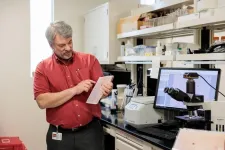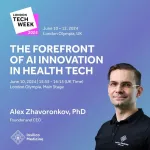(Press-News.org) The latest data on the metabolic problems faced by trans people are presented at a session at this year’s Annual Meeting of the European Association for the Study of Diabetes (Hamburg 2-6 October). While evidence on increased or decreased rates of diabetes among trans men and women remains unclear, the evidence that they face higher rates of cardiovascular disease continues to mount. The talk is by Dr Dorte Glintborg, Department of Endocrinology, Odense University Hospital, Denmark.
“While increased rates of cardiovascular disease might normally go hand-in-hand with increased rates of diabetes, for trans men (assigned female at birth AFAB), use of testosterone usually increases lean body mass and this could be protecting against an increased risk of diabetes,” explains Dr Glintborg.
“For transwomen (assigned male at birth, AMAB), hormone treatments such as oestrogen will increase fat mass and lower lean body mass, and increased oestrogen is usually associated with increased risk of autoimmune disease and inflammation. Some studies found a higher risk of type 2 diabetes in transgender women, but this could not be confirmed by others.”
She adds: “Several other factors apart from body fat/leanness and muscle mass could affect risk of vascular and metabolic diseases in transgender populations and we still need more long-term data. Indeed, it has been discussed that mental support as part of transgender care could relieve minority stress and could be protective against development of cardiovascular disease. Lifestyle changes during hormone treatment and especially higher physical activity in transgender men could protect against T2D.”
However, Dr Glintborg explains the field is still rapidly evolving and “we lack large study cohorts”.
Dr Glintborg will discuss various studies on the elevated cardiovascular risk faced by the transgender population, including one by herself and colleagues, published in The European Journal of Endocrinology, which showed that, compared with cis-gender individuals, transgender men and women were at increased risk of cardiovascular disease. The main outcome measure was cardiovascular diagnosis (any CVD) including medicine prescriptions for CVD during 2000–2018.
The authors used Danish health registers to determine cardiovascular outcomes (ICD-10 codes) and medicine prescriptions regarding CVD medicine. The Danish transgender cohort (N= 2671) included persons with International Classification of Diseases-10 diagnosis code of ‘gender identity disorder’ (1583), which implied contact to a Danish centre of gender identity and persons who had had a legal sex change (n = 1088), which implied that they had contacted the legal system and changed their gender. In total, the transgender study cohort included 1270 persons who were assigned female at birth (AFAB, transgender men) and 1401 were assigned male at birth (AMAB, transgender women).
The control population (N= 26 710) were matched to the transgender population by age (n = 5 controls of same and n = 5 controls of other birth sex) of the respective transgender case. The cohort was young - median age at study inclusion was 22 years for AFAB and 26 years for AMAB. By definition younger people generally have much lower rates of CV disease, but in this study hypertension (high blood pressure) and dyslipidaemia (abnormal blood fats) were the most common problems and could usually be treated a visit to the person’s general practitioner and receiving a prescription.
The mean follow-up time was 4.5 years for AFAB and 5.7 years for AMAB. The increased risk of any CVD was significantly higher in both transgender men and women as compared with control men or women. Transgender males (AFAB) had a 2.2 times increased risk of CVD compared with control men and a 63% increased risk compared with control women. Transgender females (AMAB) had a 93% increased risk of any CVD versus control men, and a 73% increased risk compared with control women.
Analysis of the use of gender-affirming hormone treatment (GAHT) suggested around a third of the increased risk for CVD outcomes in transgender males could be attributed to GAHT – previous research has also associated the use of hormones such as testosterone with increased cardiovascular risk. Yet in transgender females, use of GAHT (oestrogen in combination with testosterone blocker), could not explain increased CVD risk.
The authors highlight that this register-based data study did not allow them to investigate the influence of BMI, family history of CVD, minority stress and lifestyle factors (diet, smoking, exercise) on study outcomes. From this study, they concluded: “Cardiovascular and metabolic outcomes were more prevalent in transgender persons compared to controls. Gender-affirming hormone therapy exposure could contribute to the elevated cardiovascular risk in transgender men, assigned female at birth. Future studies will be able to bring further knowledge regarding mechanisms for higher cardiovascular risk in transgender men and women.”
Dr Glintborg adds: “We need no determine more about the mechanisms for adverse metabolic outcomes – are they mediated by changes in body composition or other mechanisms such as stress and lifestyle changes? For example, in many countries you need to lose weight (in Denmark to a body mass index of below 27) to become eligible for gender affirming surgery and you have to stop smoking. This could be protective against adverse outcomes.”
“A more detailed evaluation of fat, muscle, and liver function and could all be very valuable regarding mechanisms for changes in metabolic function. And randomised controlled trials regarding different treatment regiments would help massively in increasing our understanding of metabolic changes.”
And another important element affecting transgender care is the huge increase in demand for services in most European / Western countries. The resulting delay in patients receiving their first and subsequent appointments is leading to more trans women self-medicating with cyproterone acetate to supress the side effects of hormone (testosterone) therapy. Cyproterone acetate is a synthetic progestin and some studies found higher risk of hypertension in transwomen using the drug. “We need to investigate if use of cyproterone acetate in Europe is a risk factor for CVD in transgender women,” explains Dr Glintborg.
In fact, many different medication regimens are used throughout the transition journeys of trans men and trans women, and Dr Glintborg would like to see as many combinations as possible investigated for their effects on the health of transgender people.
Dr Glintborg will also discuss the idea that “the benefits of GAHT on mental health could outbalance negative effects on cardiovascular markers caused by being part of this minority group – or so-called ‘minority stress’. Like all patients with metabolic issues, doctors should discuss with their transgender patients the important of physical activity, avoiding weight gain, and stopping or avoiding starting smoking”.
END
Evidence on increased rates of diabetes unclear in trans people, but evidence on higher rates of cardiovascular disease clear
Testosterone therapy thought to be partly behind the increased risk in trans men
2023-10-06
ELSE PRESS RELEASES FROM THIS DATE:
New study at the Alzheimer’s Center at Temple casts light on protein that could help defeat Alzheimer’s disease and increase productive lifespan
2023-10-05
Alzheimer’s disease is the most common type of dementia, a disorder of progressively worsening memory and other thinking abilities. It rose up in the ranks of leading causes of death over the past several decades. It can also limit the duration of a working career, create uncertainty in the financial planning for retirement and rob patients of enjoyment and happiness in the final years. An effective treatment against this disease could give back to the patient the decision when to retire and improve quality of life in advanced age.
Now, scientists at the Alzheimer’s Center at Temple at the Lewis Katz School of Medicine at Temple University are on the trail ...
Up-and-coming researchers vie in a 'Shark Tank'-inspired competition during the Ramona Jones Friends of BrainHealth Scientist Selection Luncheon
2023-10-05
On October 2, 2023, Center for BrainHealth, part of The University of Texas at Dallas, held its annual Friends of BrainHealth Scientist Selection Luncheon at the Dallas Country Club. This year was a special one, with Ramona Jones, founding BrainHealth Advisory Board member, kicking off a five-year sponsorship of the luncheon. Her five children made this sponsorship gift in her honor and surprised her with the naming for her 95th birthday in August 2023.
The Friends of BrainHealth donor circle is dedicated to supporting ...
Who will have ‘miracle’ improvement of rheumatoid arthritis during pregnancy?
2023-10-05
Rheumatoid arthritis appears three times more often in women
Women need to know whether they can stop taking drugs while pregnant
Genetic markers could predict who will improve and who will worsen during pregnancy
When women with rheumatoid arthritis (RA) plan to become pregnant, many anguish over whether to stop their medications, risking a flareup in their disease, or continue with medication and risk possible harm to the baby.
About 50% to 75% will see their disease naturally improve during pregnancy for not-yet-known reasons, while others may see a worsening of their RA. But they have had no way of knowing which would happen to them.
Now, Northwestern Medicine scientists ...
Groundbreaking study shows defects spreading through diamond faster than the speed of sound
2023-10-05
Settling a half century of debate, researchers have discovered that tiny linear defects can propagate through a material faster than sound waves do.
These linear defects, or dislocations, are what give metals their strength and workability, but they can also make materials fail catastrophically – which is what happens every time you pop the pull tab on a can of soda.
The fact that they can travel so fast gives scientists a new appreciation of the unusual types of damage they might do to a broad range of materials in extreme conditions – from rock ripped apart ...
AI-driven earthquake forecasting shows promise in trials
2023-10-05
A new attempt to predict earthquakes with the aid of artificial intelligence has raised hopes that the technology could one day be used to limit earthquakes’ impact on lives and economies. Developed by researchers at The University of Texas at Austin, the AI algorithm correctly predicted 70% of earthquakes a week before they happened during a seven-month trial in China.
The AI was trained to detect statistical bumps in real-time seismic data that researchers had paired with previous earthquakes. The outcome was a weekly forecast in which the AI successfully predicted 14 earthquakes within about 200 miles of where it estimated they would happen and at almost exactly the ...
MSU research shows plants could worsen air pollution on a warming planet
2023-10-05
MSU has a satellite uplink/LTN TV studio and Comrex line for radio interviews upon request.
Images
Highlights:
New Michigan State University research published in the journal Proceedings of the National Academy of Sciences shows that plants such as oak and poplar trees will emit more of a compound called isoprene as global temperatures climb.
Isoprene from plants represents the highest flux of hydrocarbons to the atmosphere behind methane.
Although isoprene isn’t inherently bad — it actually helps plants better tolerate insect pests and high temperatures — it can worsen air pollution by reacting ...
Barrow Neurological Institute receives $16.7 million NIH award to help coordinate new national ALS research consortium
2023-10-05
The purpose of the award is to create the Access for All in ALS (ALL ALS) Consortium to conduct clinical research that will include ALS patients nationwide, generating a longitudinal biorepository linked to detailed clinical information that will be made available to research scientists throughout the world using a web-based portal. As part of this new consortium Barrow will manage half of 34 clinical sites in the study which spans the U.S. and Puerto Rico. The consortium will be led by researchers at Barrow, Massachusetts General Hospital and Columbia University.
“Barrow Neurological Institute is honored to be selected by the NIH to help coordinate this ...
How to protect self-esteem when a career goal dies
2023-10-05
Many people fail at achieving their early career dreams. But a new study suggests that those failures don’t have to harm your self-esteem if you think about them in the right way.
Researchers found that people who viewed career goal failures as a steppingstone to new opportunities never lost self-esteem, no matter how many times they failed. But those who thought their failures left them worse off showed a drop-off in how they felt about themselves.
“It’s not how many times you have had to give up. It is how you felt about the failures, and whether you thought they led to something better for you,” ...
Ultrasensitive blood test detects ‘pan-cancer’ biomarker
2023-10-05
Pathology experts engineered an ultrasensitive test capable of detecting a highly specific biomarker found in multiple common cancers
In collaboration with cancer researchers across the country and the globe, the team evaluated the tool’s ability to detect the biomarker in ovarian cancer, gastroesophageal cancer, colon cancer, and other cancers
Diagnostic assays have potential for early cancer detection, monitoring, and prognostics
Marker ‘LINE-1 ORF1p’ is a protein encoded by a human transposon that has further potential applications in tissue diagnostics and may also facilitate treatment of cancers for which no accurate biomarkers ...
Insilico Medicine founder and CEO Alex Zhavoronkov, Ph.D., to present on AI drug discovery at LSX Nordic Congress
2023-10-05
Alex Zhavoronkov, Ph.D., founder and CEO of Insilico Medicine (“Insilico”) will present at the 6th LSX Nordic Conference happening in Copenhagen Oct. 10-11. Zhavoronkov, a leader in generative artificial intelligence (AI) technologies for drug discovery and biomarker development, will present on Oct. 11, 2pm CET on “‘How Artificial Intelligence is Shaping the Future of Drug Discovery, Design, and Development.”
The LSX Nordic Congress is a leading strategy, investment and partnering conference for the Nordic region connecting life science and healthcare ...
LAST 30 PRESS RELEASES:
Cal Poly’s fifth Climate Solutions Now conference to take place Feb. 23-27
Mask-wearing during COVID-19 linked to reduced air pollution–triggered heart attack risk in Japan
Achieving cross-coupling reactions of fatty amide reduction radicals via iridium-photorelay catalysis and other strategies
Shorter may be sweeter: Study finds 15-second health ads can curb junk food cravings
Family relationships identified in Stone Age graves on Gotland
Effectiveness of exercise to ease osteoarthritis symptoms likely minimal and transient
Cost of copper must rise double to meet basic copper needs
A gel for wounds that won’t heal
Iron, carbon, and the art of toxic cleanup
Organic soil amendments work together to help sandy soils hold water longer, study finds
Hidden carbon in mangrove soils may play a larger role in climate regulation than previously thought
Weight-loss wonder pills prompt scrutiny of key ingredient
Nonprofit leader Diane Dodge to receive 2026 Penn Nursing Renfield Foundation Award for Global Women’s Health
Maternal smoking during pregnancy may be linked to higher blood pressure in children, NIH study finds
New Lund model aims to shorten the path to life-saving cell and gene therapies
Researchers create ultra-stretchable, liquid-repellent materials via laser ablation
Combining AI with OCT shows potential for detecting lipid-rich plaques in coronary arteries
SeaCast revolutionizes Mediterranean Sea forecasting with AI-powered speed and accuracy
JMIR Publications’ JMIR Bioinformatics and Biotechnology invites submissions on Bridging Data, AI, and Innovation to Transform Health
Honey bees navigate more precisely than previously thought
Air pollution may directly contribute to Alzheimer’s disease
Study finds early imaging after pediatric UTIs may do more harm than good
UC San Diego Health joins national research for maternal-fetal care
New biomarker predicts chemotherapy response in triple-negative breast cancer
Treatment algorithms featured in Brain Trauma Foundation’s update of guidelines for care of patients with penetrating traumatic brain injury
Over 40% of musicians experience tinnitus; hearing loss and hyperacusis also significantly elevated
Artificial intelligence predicts colorectal cancer risk in ulcerative colitis patients
Mayo Clinic installs first magnetic nanoparticle hyperthermia system for cancer research in the US
Calibr-Skaggs and Kainomyx launch collaboration to pioneer novel malaria treatments
JAX-NYSCF Collaborative and GSK announce collaboration to advance translational models for neurodegenerative disease research
[Press-News.org] Evidence on increased rates of diabetes unclear in trans people, but evidence on higher rates of cardiovascular disease clearTestosterone therapy thought to be partly behind the increased risk in trans men




